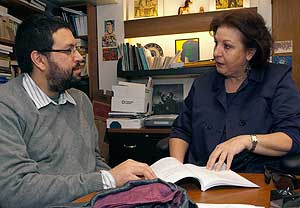As a young woman growing up in Montevideo, Uruguay, Mabel Moraña developed an interest in literature, especially European literature. Early in her academic career, she published her first book on Franz Kafka’s “The Metamorphosis.”

Years in voluntary exile from her home country helped forge her true passion — the study of culture and literature of Latin America.
“When I left Uruguay for Venezuela in my late 20s, I had close contact with other individuals already in exile who came from many different disciplines,” says Moraña, Ph.D., the William H. Gass Professor in Arts & Sciences and director of the Latin American Studies Program in Arts & Sciences. “I encountered different intellectual agendas and ideological perspectives, which was very productive for my career.”
Political unrest in Uruguay in the 1970s and ’80s caused the voluntary and forced emigration of thousands of its citizens as they sought political asylum in countries throughout the world.
For Moraña, the event became a turning point in her life. Because she left Uruguay voluntarily, she was able to return, going back often to collect material and write about the development of cultures under extreme censorship.
“Having to leave Uruguay in my late 20s opened my eyes to different kinds of cultural issues related to ethnicity and social inequality that were very dramatic at the time,” she says.
A world traveler and renowned expert in her field, Moraña brings a wealth of experience to her position at the University.
“Professor Moraña is a distinguished and influential scholar who has achieved an extraordinary record of publication by authoring and editing numerous landmark studies in the fields of Latin American literatures and cultures,” says Elzbieta Sklodowska, Ph.D., the William R. Randolph Professor in Arts & Sciences and chair of the Department of Romance Languages & Literatures in Arts & Sciences.
“Her talents and accomplishments as an intellectual leader particularly skilled at building new programs represent a great asset to Washington University, especially now, as we strive to enhance the interdisciplinary and intercultural dimension of our research and teaching,” Sklodowska says.
Student and teacher
Born in Uruguay, Moraña spent several years as professor of literature and philosophy at Instituto de Profesores Artigas in Montevideo.

She left the country in 1975 for Venezuela, where she studied philosophy at Universidad Simón Bolívar in Caracas and worked as a researcher at the renowned Centro de Estudios Latinoamericanos Romulo Gallegos.
She then moved with her family to the United States, where she earned a doctorate in Hispanic literature from the University of Minnesota in 1983. Her dissertation was on literature and national culture in Latin America from 1910-1940.
Her first positions were as a lecturer at the University of Washington in Seattle and as assistant professor of Spanish and Portuguese at the University of Southern California. In 1995, she joined the University of Pittsburgh, where she chaired the program in Latin American literature and culture and served for 10 years as director of publications of Instituto Internacional de Literatura Iberoamericana.
She came to Washington University in 2005 following visiting appointments at Harvard University; the University of California, Santa Cruz; and several universities in Europe and Latin America.
Moraña has devoted much of her time to contemporary literature and cultural studies, particularly critical theory applied to peripheral societies and Latin American cultures. She has produced numerous collected books on topics such as the reinterpretation of intellectual functions in Latin America, baroque and neo-baroque in Latin American culture, and problems related to women’s literature.
She also has published more than 25 collected books and has authored several books on topics related to cultural theory in Latin America.
A new direction
|
Mabel Moraña |
|
Title: The William H. Gass Professor in Arts & Sciences and director of the Latin American Studies Program in Arts & Sciences Born: Montevideo, Uruguay Research interests: Spanish-American colonial literatures, particularly those of colonial Mexico; nation and modernity; cultural criticism and cultural theory; and contemporary Latin American narrative Hobbies: Traveling and spending time with her family |
Moraña spends about 25 percent of her time in the department of Romance languages and 75 percent in the International & Area Studies Program in Arts & Sciences, where she directs the Latin American studies track. She was hired to help bolster Latin American studies and has made great strides.
In connection with the corresponding departments, she was instrumental in hiring two key appointments: Ignacio Sánchez Prado, Ph.D., assistant professor of Spanish and of international and area studies, who was one of her students at the University of Pittsburgh; and Derek Pardue, Ph.D., assistant professor of anthropology in Arts & Sciences and of international and area studies.
“With them, we are trying to build the program using the resources the University has in other departments,” Moraña says. “We run a very successful interdisciplinary program at the undergraduate level and are hoping to expand to the graduate level so that students can eventually complete a graduate certificate in Latin American studies while earning their Ph.D.”
Moraña also has organized and helped establish two study abroad programs in Latin America: one in Puebla, Mexico, and the other in Quito, Ecuador. She hopes to expand those offerings in the future.
Under the brand name “South by Midwest,” Moraña has helped to organize and host two international conferences on Latin American cultural studies. The first, on the topic of social change, took place in 2006. The second, organized with Bret Gustafson, Ph.D., assistant professor of anthropology, was held last year on “Rethinking Intellectuals in Latin America.” The next conference in the series is planned for Spring 2011.
Her efforts seem to be paying off. Latin American studies is the most popular of the three tracks offered in the International & Area Studies Program, the others being Asian studies and European studies.
“Mabel Moraña has been a major force in building Latin American studies, the result being that this part of the International & Area Studies Program at Washington University has experi-enced major growth,” says James V. Wertsch, Ph.D., the Marshall S. Snow Professor in Arts & Sciences and director of the International & Area Studies Program.
“We now have impressive international visibility in this field of study. As Washington University continues to strengthen its global presence, colleagues like Professor Moraña are going to be ever more important,” he says.
As she looks toward the future of Latin American studies at the University, Moraña would like to expand the field to include some areas not currently covered in Romance languages and literatures, especially Andean studies.
“That’s such an important area where so much social change has taken place recently, and we really don’t have any experts in those topics in this department,” she says.
Optimistic about the future
Moraña has two daughters who have traveled the world with her. Juliana Varela is a lecturer in Spanish at the University and lives in St. Louis. Varela has two daughters: Aitana, 4, and Lucia, 2.
Rosalia Bermudez, Moraña’s older daughter, is an artist splitting time between San Francisco and New York.
“It’s wonderful having at least one of my daughters here in town,” Moraña says. “I love spending time with her and with my grandchildren. We are a very close family.”
When she’s not researching or teaching one of her three current course offerings, Moraña loves to travel throughout the world and regularly gets back to Uruguay to lecture and see family.
She enjoys her job at the University and is optimistic about the future of the Latin American Studies Program.
“We have some truly outstanding faculty members here,” she says. “But I think we can always improve. I recognize that the University is going through some difficult financial times and we do need to be cautious, but at the same time, we need to be persistent in our goals of pursuing what we want to achieve. We can always update and enhance our academic offerings.”